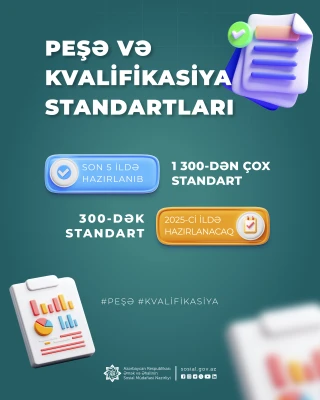A high-level roundtable on the topic of "Green Jobs and Skills" was held within the framework of the 29th session of the Conference of the Parties (COP29) to the United Nations Framework Convention on Climate Change. The event was attended by high-level officials from various countries and international organizations.
The roundtable, moderated by Mia Seppo, Assistant Director-General of the International Labour Organization (ILO) for Jobs and Social Protection, discussed issues such as investing in the development of the skills of the current and future workforce to support a just transition to a green economy, promoting decent green jobs and the development of skills for these jobs, and exchanging best practices in this field.
The Minister of Labour and Social Protection of Population, Sahil Babayev, responded to the moderator's question regarding the efforts being made in our country to equip the workforce with the skills required for green industries.
The Minister stated that the transition to a green economy also requires the development of a qualified workforce in these areas. He highlighted that the rapid development of green technologies necessitates the continuous evolution of the required skills, and one of the key priorities is ensuring that our education and vocational training systems adapt to these changes. Like other countries aiming for a green economy, Azerbaijan is also working to equip its workforce with the new skills needed for the transition to a green economy. The process requires a workforce with technical expertise in fields such as engineering, environmental sciences, digital technologies, and more.
S.Babayev noted that, due to the growing global demand for intensive vocational training and upskilling, the Ministry of Labour and Social Protection of Population has also prioritized this area. He mentioned that the Ministry currently operates five regional vocational training centers, with several more under construction. He further pointed out that these centers offer training in green skills, such as the operation of alternative energy systems and equipment, assembly of renewable energy devices, and installation of wind turbine systems, to unemployed individuals and job seekers.
The Minister also emphasized that the scale of efforts to train qualified personnel for green jobs in Karabakh and East Zangazur is steadily expanding. He underlined that these training programs in the mentioned areas, not only contribute to the development of the green economy but also create new employment opportunities for unemployed and job-seeking individuals. It was also highlighted that, within the framework of the state employment policy, ensuring effective employment and decent work for youth, women, and individuals with disabilities is identified as a primary goal. In addition, several incentive programs were implemented to support the integration of vulnerable groups into the labour market and to encourage employers to hire them.
At the roundtable, speeches were delivered by high-level officials, including Mikheil Sarjveladze, the Minister of Internally Displaced Persons from Occupied Territories, Labour, Health, and Social Affairs of Georgia, Mary Craig, Parliamentary Adviser to the Secretary of State of the United Kingdom, Shavar Siraj, Regional Vice President of the Workers' Federation of Pakistan, Sonya Janahi, Vice President of the Employers' Federation for Asian countries and representative of the Bahrain Chamber of Commerce and Industry, Shanti Jagannathan, Director of the Human and Social Development Sectors Group of the Asian Development Bank, Azer Bayramov, Director General of the Labour Center of the Organization of Islamic Cooperation, Ingrid-Gabriela Hoven, Managing Director of the German International Cooperation Agency, Nigar Mammadova, Member of the Milli Majlis of the Republic of Azerbaijan, Anjela Basovic, State Secretary of the Ministry of Labour, Employment, and Social Dialogue of Montenegro; Adil Chalishkan, the Deputy Minister of Family and Social Services of Türkiye, and others.
They answered the moderator's questions and provided information about the efforts being made in their countries to develop the skills of the workforce in order to support a just transition to a green economy, as well as the goals ahead in this field. It was also emphasized that cooperation and exchange of experiences in the development of green jobs and skills for these jobs is crucial. Elmar Mammadov, Co-Chair of the Global Initiatives Group of the COP29 Action Agenda, highlighted the importance of the discussions held on this current topic.
